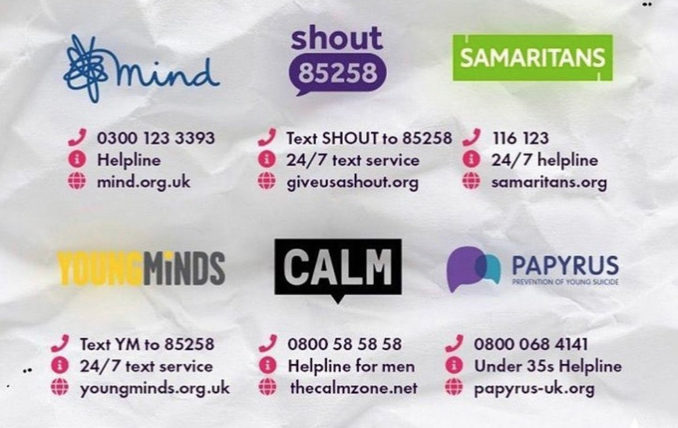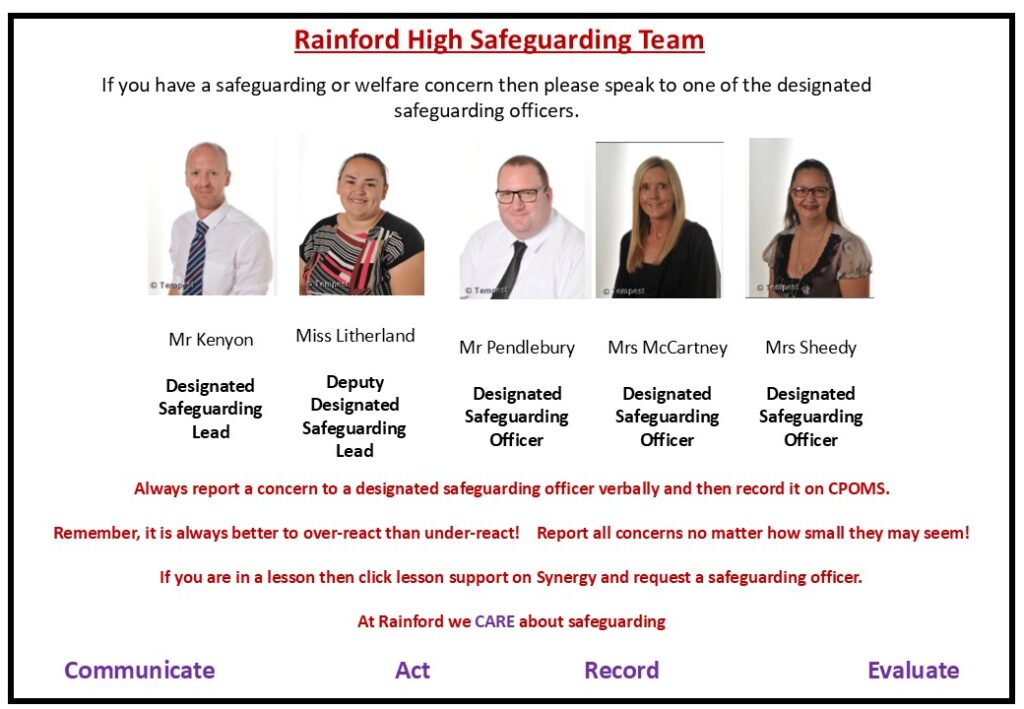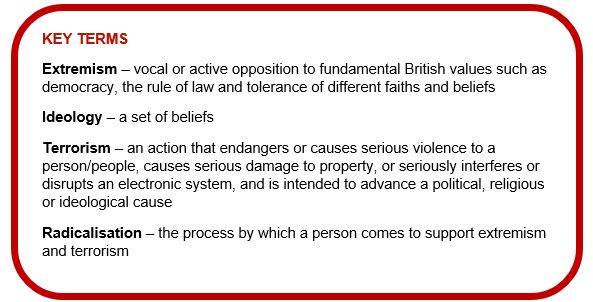
Designated Safeguarding Staff

Senior Designated Person
Mr J Kenyon ~ Director of Safeguarding
Email: [email protected]
Tel No: 01744 885914
Designated People
Paula Litherland – Deputy Designated Safeguarding Lead
Email: [email protected]
Tel No: 01744 885914
Mark Pendlebury~ Pastoral Support Manager
Email: [email protected]
Tel No: 01744 885914
Liz Sheedy – Pastoral Support Manager
Email: [email protected]
Tel No: 01744 885914
Alison McCartney
Email: [email protected]
Tel No: 01744 885914
School Trustee with overview of Safeguarding: Joanne Lloyd
Safeguarding
Rainford High is committed to safeguarding and promoting the welfare of every child and expects all staff and volunteers to share this commitment.
As a school we have robust safeguarding processes and procedures in place to which all staff are trained to adhere.
Sometimes we may need to share information and work in partnership with other agencies when there are concerns about a child’s welfare. We will ensure that our concerns about our students are discussed with his/her parents/carers first unless we have reason to believe that such an action would be contrary to the child’s welfare.
What should I do if I think a child is being abused?
If you have a concern regarding the safety of a student you can contact one of the Designated Safeguarding Officers (See above) or you can call the St Helens Contact Centre on 01744 676600 during normal office hours or the Emergency Duty Team on 0345 050 0148. Further advice and guidance, regarding procedures in St Helens, can be found here.
Resources for Parents
St Helens Safeguarding Children – The Safeguarding Children Partnership (formerly known as the Local Safeguarding Children Board – LSCB), is a multi-agency partnership with an independent chair. It’s membership is comprised of senior managers from all statutory agencies in St. Helens. It’s purpose is to ensure agencies in St. Helens are working together effectively to keep children safe. Visit their website here.
Healthy Living St Helens
The Healthy Living Team’s overall aim is to make significant ongoing contribution to the improvement of the physical and mental health, well-being and quality of life of the people of St Helens. Visit their website here.
Keeping Safe Online
Children and young people spend a lot of time online – it can be a great way for them to socialise, explore and have fun. But children do also face risks like cyberbullying or seeing content that’s inappropriate.
Whether you’re unsure about what happens online or are up to speed with new technology, it’s important that you talk to your child about keeping safe.
It may feel daunting, but you don’t need to be an expert on the internet. Understanding what children do online and the risks they face will help you keep your child safe online. Below are some links to help you keep your child safe:
National Online Safety – Here you will find the most up to date guides for social media apps and platforms. Find out more information about each app and to download useful tips to help keep children safe.
Childnet – Information and advice on Internet Safety
Thinkuknow – Advice and guidance for keeping children safe on the internet and using Social Media
St Helens Gateway – One stop shop for all services available in St Helens
Educate Against Hate – This website gives parents, teachers and governors practical advice on protecting children from extremism and radicalisation.
Keeping Children Safe Online – NSPCC/O2 resource, where they offer support online, over the phone and face to face with parents about keeping children safe online.
Safeguarding Guidance for Schools: Keeping Children Safe in Education click here.
Prevent Strategy
Prevent is 1 of the 4 elements of CONTEST, the government’s counter-terrorism strategy. It aims to stop people becoming terrorists or supporting terrorism.
The Prevent strategy:
- responds to the ideological challenge we face from terrorism and aspects of extremism, and the threat we face from those who promote these views
- provides practical help to prevent people from being drawn into terrorism and ensure they are given appropriate advice and support
- works with a wide range of sectors (including education, criminal justice, faith, charities, online and health) where there are risks of radicalisation that we need to deal with.
As a school, we always aim to keep our students safe from harm and this includes protecting them from the risk of radicalisation.
Provision is in place to:
- Ensure staff are able to identify students who may be vulnerable to radicalisation.
- Ensure staff know what to do if students have been identified.
- Protect students from the risk of radicalisation as part of our safeguarding duties, whether these risks come from within the family or are the product of outside influences.
- Build students resilience to radicalisation by promoting fundamental British values and enabling pupils to challenge extremist views.
- Within our curriculum, we will ensure that we assist our students in their personal, social and emotional development and understanding of the world.

Further information on Prevent Duty can be found here and below:
Prevent Strategy Information for Parents
What is the Prevent strategy?
Prevent is a government strategy designed to stop people becoming terrorists or supporting terrorist or extremist causes.
The Prevent strategy covers all types of terrorism and extremism, including political and religious extremism.
How does the Prevent strategy apply to schools?
All schools (as well as other organisations) have a duty to safeguard children from radicalisation and extremism.
This means schools have a responsibility to protect children from extremist and violent views, in the same way we protect them from drugs or gang violence.
Importantly, schools can provide a safe place for pupils to discuss these issues so that they better understand how to protect themselves.
What does this mean in practice?
Different schools will carry out the Prevent duty in different ways, depending on the age of the children and the needs of the community.
Many of the things we already do in school to help children become positive, happy members of society also contribute to the Prevent strategy.
Include information about your school’s approach here, for example:
- Exploring other cultures and religions and promoting diversity
- Challenging prejudices and racist comments
- Developing critical thinking skills and a strong, positive self-identity
- Promoting the spiritual, moral, social and cultural development of pupils, as well as British values such as democracy
- Protecting children from the risk of radicalisation, such as using filters on the internet or vetting visitors who come into school
Frequently Asked Questions
How does Prevent relate to British values?
Schools have been required to promote British values since 2014, and this will continue to be part of the response to the Prevent strategy.
British values include:
- Democracy
- The rule of law
- Individual liberty and mutual respect
- Tolerance of different faiths and beliefs
Isn’t my child too young to learn about extremism?
The Prevent strategy is not just about discussing extremism itself, which may not be appropriate for younger children. It is also about teaching children values such as tolerance and mutual respect.
Schools should make sure any discussions are suitable for the age and maturity of the children involved.
Is extremism really a risk in our area?
Extremism can take many forms, including political, religious and ideological extremism. Some of these may be a bigger threat in our area than others.
The intention is to give children the skills to protect them from any extremist views they may encounter, now or later in their lives.

Useful Links
Advice to parents and carers on keeping children safe from abuse and harm – GOV.UK (www.gov.uk)

